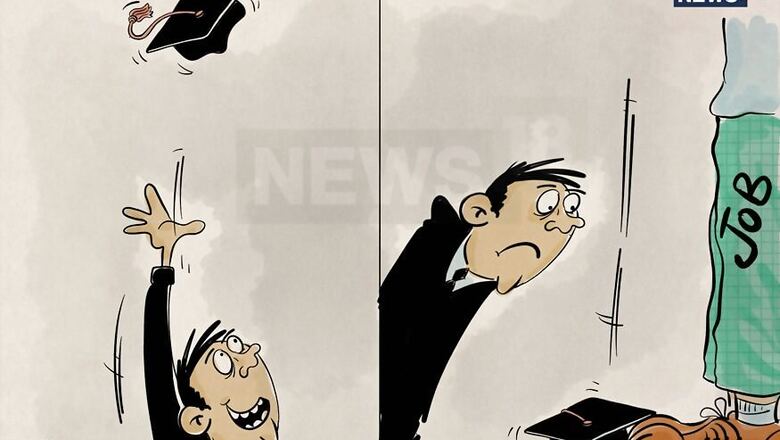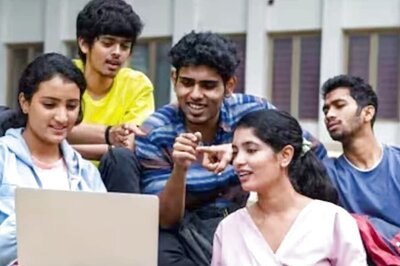
views
With the country losing countless jobs due to automation, technical colleges finally seem to realise the importance of academic courses relating to artificial intelligence (AI), machine learning (ML), robotics, data crunching and analysis. However, the realisation is not pan-India.
In the recently concluded approval process of All India Council for Technical Education (AICTE), government regulatory body for technical education, the Council has approved 61 new courses, a rise in 60 percent, offered by technical colleges for subjects relating to automation.
However, the cause of worry remains as the increase in courses is concentrated only in ten states, namely, Andhra Pradesh, Goa, Gujarat, Karnataka, Kerala, Madhya Pradesh, Maharashtra, Punjab, Tamil Nadu and Telangana.
According to AICTE’s data sets accessed by News18, the rest of the states have witnessed no new courses in these disciplines for the past five years.
Talking to News18, chairman of AICTE, Anil Sahasrabudhe said, “Many colleges have requested for adding optional subjects in disciplines such as machine learning, data crunching, data analysis and artificial intelligence this year. There is also a steep rise in colleges starting dedicated courses in these subjects. The number of new courses will only increase in the years to come.”
The vast difference in state numbers is something that AICTE is deliberating upon, said the chairman.
The steep rise in new courses is unprecedented. For the academic year 2017-18, the Council approved 38 new courses in robotics, data analysis, machine learning and artificial intelligence in comparison with 61 this year. The numbers were a close 33 for the academic year 2016-17.
Global importance of these courses was reflected when a Japanese delegation, in November last year, visited the Indian Institute of Technology, Guwahati campus. The overseas delegation was looking for students with artificial intelligence and deep learning skills for companies in Japan.
Sources in the IIT placement cell informed that they are ready to visit the college for campus placements if the institute could provide them with people trained with AI skills. The delegation is ready to hire 35-40 people next year.
According to multiple recruitment consultancies, India supports more than half of the world’s tech outsourcing requirements. However, employers have been finding it difficult to get AI and ML trained individuals.
“Technology is changing faster than ever today. Some of the jobs which were not present two years back are buzzwords today. Hence, the talent-skill gap is more worrying than ever. Udacity's skill-based Nanodegree Programs are built in collaboration with top industry experts and will help students acquire cutting-edge skills such as AI, ML, Deep Learning, Self-Driving Car engineering, sought after by top employers around the world, " said Ishan Gupta, Managing Director of Udacity India.
In an effort to bridge the demand and supply gap Google has recently partnered with nanodegree training providers Udacity and Pluralsight to give out 1.3 lakh scholarships in emerging technologies, including ML, to Indian developers. The global tech giant will also be training 1,000 faculty members and 400 colleges in India.
“We have developed a course specifically for Indian students. We are not focussed on the IITs, but the community colleges. The first country where we will do this is India and then we can do in the rest of the world,” William Florance, Developer Products Group and Skilling Lead for India, Google.
Plugging the Gaps
India has witnessed widespread job losses in the recent past. According to a joint report by FICCI, Nasscom and EY Indian industries will need 54 lakh less employees in the next two years.
In order to address the problem of India’s low strike rate in automation jobs, AICTE in consultation with ministry of electronics and information technology is working on new syllabi for technical colleges in order to accommodate the modern day features.
“There is a separate committee set up which is working to bridge the gaps in textual knowledge and practical skills,” informed Sahasrabudhe.
Ajay Kumar, Aditional Secretary, Ministry of Electronics and Information Technology estimates that only one in 10 colleges, at best, have courses on AI or ML.
“We are in process of drafting a programme for skilling in AI,” said Kumar.
Curbing Brain Drain
It is only normal that Indian students opt for automation related courses abroad. With the education system in the country yet to find its footing in the new yet attractive arena, universities based out of United States and Europe witnessed an increase in applications from India for courses relating to AI and ML this year.
The number of applications from prospective Indian students has almost doubled in the past one year alone, according to officials at foreign institutions.
The surge in numbers can be understood by the following:
a) For the academic year 2017-18 only four Indian students were pursuing automation courses at the University of Amsterdam. The numbers have gone up to 13 in the master’s in AI degree for the current year.
b) The Utrecht University, Netherlands, witnessed 80 Indian students applying for courses in AI and ML in comparison with 30 last year.
c) The University of Sheffield, in the United Kingdom, saw a 55 percent surge in applications in a year from Indian students for its master’s programme in AI.
Getting There
News18 had earlier reported that government think-tank NITI Aayog and global tech giant Microsoft are set to join hands for a project wherein artificial intelligence will be used to identify students who are likely to drop out of schools.
NITI Aayog has also partnered with IBM and ISRO to provide real-time advice to farmers.
The government is also working on using artificial intelligence in providing information on types of seeds and fertilizers to be used. There are plans to provide detailed long-term information to farmers on monsoon timings and patterns. The plan also encompasses market price information so that farmers don’t sell at a loss.
NITI Aayog, in close collaboration with various health experts, is working in early detection of cardiac arrests and diabetic retinopathy using artificial intelligence. The pilot for this will be rolled out within the next 15 days in 25 aspirational districts.
During Budget 2018, Finance Minister Arun Jaitley designated Amitabh Kant-led Niti Aayog to establish a National Programme to direct efforts in the area of Artificial Intelligence towards national development.
"We are not only focusing on 'Ease of Doing Business' but also 'Ease of Living'," Finance Minister Arun Jaitley had pronounced in his fifth Union Budget speech.
The department of science is also set to open centres of excellence which will invest in research, training in digital manufacturing, big data analysis, quantum communication, and the Internet of Things (IOT).
(The story is part of News18 series ##onthejob. The third part of the series will focus on how India will have no mass recruiters in the coming future)




















Comments
0 comment